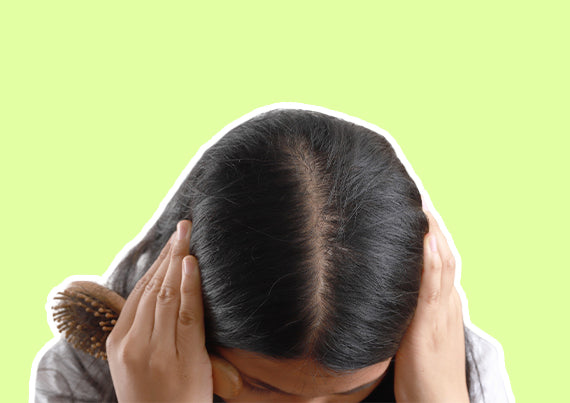Scalp Folliculitis in Teenagers: Prevention Tips and Treatment

"Dealing with scalp folliculitis as a teenager? You're not alone!"
Addressing the Invisible Struggle
Scalp folliculitis, often mistaken for dandruff or acne, is an inflammatory disorder that affects teenagers' scalp hair follicles, causing itchy bumps or pustules. This condition can significantly impact teenagers' physical and emotional well-being, affecting their self-confidence, social interactions, and emotional health. It can lead to anxiety, embarrassment, and even depression. Untreated scalp folliculitis can worsen, leading to more severe symptoms and potential scarring. The emotional toll can lead to feelings of isolation, low self-esteem, and depression in some cases. This blog will explore the world of scalp folliculitis in teenagers, providing practical advice for prevention and treatment. It will also explore the underlying causes and effective management strategies to help teenagers navigate their journey to healthier, happier scalps. Understanding scalp folliculitis's hidden struggles can empower teenagers to take control of their hair and their lives
Understanding Scalp Folliculitis in Teenagers
Teenagers are frequently affected by scalp folliculitis, a skin condition that causes inflammation or infection of the hair follicles on the scalp. It causes physical and mental distress, ranging from minor discomfort to severe cases of extensive inflammation. Typical causes include bacterial or fungal infections, irritation or trauma, hormonal changes throughout adolescence, poor scalp hygiene, and environmental conditions like hot and muggy weather. The soreness and itching that follow provide distractions, making it difficult to concentrate on academics or other activities. Furthermore, visible signs and symptoms, such as pustules or red bumps, cause humiliation and contribute to social distancing. Teens' confidence and self-esteem may be undermined by this ongoing conflict, which may result in psychological issues and social isolation.
Given these difficulties, teenagers and their caregivers must recognize the symptoms of scalp folliculitis. It's critical to seek the right care to prevent long-term issues as well as to ease suffering. Teenagers can recover their sense of well-being by diagnosing and treating scalp folliculitis early on, ensuring that their academic achievement, social interactions, and emotional health are not jeopardized.
Prevention Tips for Scalp Folliculitis
Scalp folliculitis management and prevention revolve around maintaining optimal scalp hygiene, choosing appropriate hair care products, and adopting a balanced diet. Here's how teenagers can effectively manage and prevent scalp folliculitis:
Maintaining Good Scalp Hygiene
Regular and thorough washing of the scalp is essential to remove excess oil, dirt, and bacteria that can clog hair follicles and trigger inflammation. Teenagers should aim to wash their hair every 1-2 days using a gentle shampoo suitable for their hair type. During washing, ensure to lather the shampoo thoroughly and massage it into the scalp to effectively remove any buildup. Follow up with a thorough rinse using lukewarm water to ensure no residue is left behind.
Avoiding Excessive Use of Hair Products
Hair products such as gels, mousses, or styling sprays can accumulate on the scalp, leading to pore blockage and folliculitis. Teenagers should use these products sparingly and ensure thorough removal at the end of the day. Overuse of styling products should be avoided to prevent the buildup of residues that may exacerbate folliculitis.
Choosing Suitable Hair Care Products
Opt for hair care products labelled as "non-comedogenic" or "oil-free" to minimize the risk of pore blockage and inflammation. Look for shampoos and conditioners enriched with ingredients known for their anti-inflammatory and antimicrobial properties, such as tea tree oil, salicylic acid, or zinc pyrithione. These ingredients can help maintain scalp health and prevent folliculitis flare-ups.
Adopting a Balanced Diet
Encourage teenagers to maintain a balanced diet comprising fruits, vegetables, whole grains, and lean proteins to support scalp health and reduce inflammation. Foods rich in omega-3 fatty acids, including salmon, walnuts, and flaxseeds, can help alleviate inflammation and promote overall skin health. By incorporating these dietary choices, teenagers can support their scalp health from within and reduce the likelihood of folliculitis outbreaks.
By adhering to these guidelines, teenagers can effectively manage scalp folliculitis and minimize its impact on their daily lives, ensuring healthier and happier scalps in the long run.
Treatment Approaches for Scalp Folliculitis
Scalp folliculitis can be managed effectively through various treatment approaches. Over-the-counter treatments, such as medicated shampoos, can reduce inflammation and prevent bacterial or fungal growth in mild cases. Active ingredients like salicylic acid, tea tree oil, or benzoyl peroxide can help unclog hair follicles, reduce inflammation, and promote scalp healing. For severe cases or those resistant to over-the-counter treatments, prescription medications may be necessary. Dermatologists may prescribe topical antibiotics or antifungal medications to combat infections associated with folliculitis. Oral antibiotics or antifungal medications may also be prescribed for widespread or persistent cases.
Other treatment options for resistant cases include steroid injections, laser therapy, or light-based treatments. These advanced treatments may offer relief for individuals with chronic or severe scalp folliculitis. Consulting a dermatologist is crucial for proper diagnosis and treatment recommendations, especially for severe or persistent cases. A dermatologist can accurately assess the severity of folliculitis, identify underlying causes, and tailor a treatment plan to address the individual's specific needs. They can also monitor treatment progress, provide guidance on proper skincare practices, and offer support and reassurance throughout the healing process. By seeking professional guidance, individuals can ensure they receive the most effective and appropriate treatment for scalp folliculitis, leading to improved scalp health and reduced recurrence of folliculitis flare-ups.
Lifestyle Changes and Management Strategies
Managing scalp folliculitis requires a comprehensive approach that includes lifestyle adjustments and proactive strategies. Here's how to effectively manage scalp folliculitis:
Stress Management
Reducing stress levels is crucial to preventing folliculitis flare-ups. Techniques like mindfulness meditation, deep breathing exercises, yoga, and regular physical activity can help alleviate stress. Engaging in enjoyable activities and spending time with loved ones also promotes relaxation and emotional well-being.
Choosing Hair Accessories Wisely
To prevent excess sweating and moisture buildup on the scalp, opt for breathable hats made of materials like cotton or linen. Avoid tight hairstyles that can irritate the scalp and exacerbate folliculitis. Instead, go for loose and gentle hairstyles to maintain scalp health and minimize flare-ups. Protecting Against Environmental Irritants
Shield your scalp from environmental pollutants and sun exposure by wearing a wide-brimmed hat or using a scarf or umbrella when outdoors. Applying a gentle, fragrance-free sunscreen designed for sensitive skin can also protect against sunburn and irritation.
Regular Scalp Checks
Stay vigilant for signs of folliculitis recurrence or worsening symptoms. Check your scalp regularly for redness, swelling, or pustules. Early detection is key to prompt intervention. If you notice any concerning changes, consult a dermatologist for proper diagnosis and treatment.
Incorporating these simple lifestyle adjustments and proactive measures into your daily routine, you can effectively manage scalp folliculitis and improve your overall quality of life.
Psychological Impact and Coping Strategies
Scalp folliculitis not only affects teenagers physically but also takes a toll on their emotional well-being, causing feelings of self-consciousness, embarrassment, and social withdrawal. To cope with these challenges, teenagers should first acknowledge the emotional impact and address it proactively. By openly communicating with trusted individuals, they can alleviate emotional distress and feel supported. Focusing on their strengths, talents, and inner qualities, engaging in enjoyable activities, and setting achievable goals can boost self-esteem and foster a positive body image. Additionally, connecting with online communities or support groups tailored for teenagers with scalp folliculitis provides a safe space for sharing experiences, seeking advice, and finding encouragement.
The Teenilicious Anti-Dandruff Combo is a comprehensive solution for teenagers dealing with scalp folliculitis and dandruff issues. The combo includes the Teenilicious Anti-Dandruff Lotion for Folliculitis and the Teenilicious Anti-Dandruff Shampoo, designed to target the root causes of folliculitis. It works synergistically to combat common and wet dandruff, relieve folliculitis symptoms, prevent dandruff recurrence, promote a healthy scalp, and encourage hair growth. Encouraging teenagers to take proactive steps in managing scalp folliculitis and seeking support is important. This message of hope and empowerment reassures teenagers that they have the resources and capabilities to overcome scalp folliculitis and achieve optimal scalp health.











